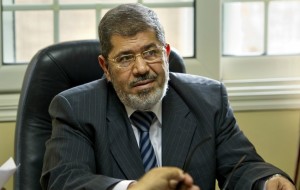Egypt: Morsy’s Move, More Change to Come
By Jane Kinninmont
 The moves by Egypt’s first elected president, Mohammed Morsy, to assert his authority over the armed forces represent a significant play for power and a step towards a civilian state. Yet they are likely to have had at least the acquiescence of elements within the military.
The moves by Egypt’s first elected president, Mohammed Morsy, to assert his authority over the armed forces represent a significant play for power and a step towards a civilian state. Yet they are likely to have had at least the acquiescence of elements within the military.
Egypt’s political transition involves a variety of struggles and contests. One of these is a struggle between groups that would prefer the country to complete a full-scale revolution, including a reorganization of economic structures, and those that prefer a negotiated transition, perhaps comparable to some of the ‘pacted transitions’ that democratization theorists have analyzed in Spain, Chile and elsewhere. The downside of a negotiated transition is that it tends to limit the degree of change that takes place. The upside is that it may be less likely to lead to violence.
Over the past year and a half, leaders of the Muslim Brotherhood and of the army have repeatedly sought to find ways to compromise and to accommodate each other’s interests, while at the same time coming into political conflicts over certain areas (most notably the role of the parliament and the constitution-drafting committee). Indeed, the Brotherhood, the Freedom and Justice Party that it founded, and Morsy himself have often found themselves criticized by revolutionary youth groups who fear the Brotherhood will do a backroom deal with the generals to become, in effect, the new autocrats.
In practice, the apparent process of mutual accommodation is unstable, tense, and opaque. It appeared to have broken down on the eve of the presidential election, when the ruling Supreme Council of the Armed Forces issued a unilateral constitutional declaration stripping the president of his powers over the armed forces, while the constitutional court ruled that the parliament was legally invalid, and dismissed it. Yet after several days of delay to the election results, Morsy’s victory was announced, indicating that the Supreme Council of the Armed Forces (SCAF) was not prepared to go through with a full-scale electoral coup.
With his own constitutional declaration, Morsy has reclaimed the powers that SCAF stripped from the president’s office. He has made bold moves to assert his authority, as the elected president, to appoint the senior military leadership, which SCAF had tried to take away from him. The minister of defense and head of SCAF, Field Marshal Mohammed Hussein Tantawi, and the chief of staff, Sami Annan, have both been removed to face-saving advisory roles, while the heads of the army, navy and air force have all also been sacked. Morsy has also appointed a vice-president – a post that former president Hosni Mubarak had resisted filling for years. His choice was Mahmoud Mekki, a judge who previously suffered legal threats after speaking out against Mubarak-era election-rigging.
A step towards a civilian state
These moves are an important step on the road to a civilian state. Yet Morsy may have managed to avoid a direct confrontation with the armed forces, which, after all, retain the monopoly of force in Egypt. The inner workings of the military are hardly transparent, but Tantawi has never been thought particularly popular, and at 76, his age could be seen as a liability in what is now a younger Egyptian political scene. Mubarak’s former defense chief, Omar Suleiman, who was the same age, died suddenly in the US just a month ago.
Just as the military ultimately acquiesced in the departure of Mubarak, younger officers may well have thought their interest were better served by allowing the top layer of senior generals to retire or move sideways, and to continue negotiating with the Brotherhood over the broader future of the military as an institution; broader issues such as the secrecy of its budget and the maintenance of its economic interests may matter more to them than the personal position of Tantawi.
Centralization of power continues
Meanwhile, Mr. Morsy has also expanded the president’s powers to include all the powers that SCAF assigned itself last year, through a previous constitutional declaration. These include the authority to legislate. He has thus consolidated the centralization of power that was pursued by the military junta. Meanwhile, the parliament remains suspended.
This is all intended to be temporary. Morsy tried to reinstate the parliament in early July, as one of his first acts as president, but was banned from doing so by the constitutional court. Those liberals who cheered the dissolution of the parliament because it was dominated by Islamists may be beginning to feel this was somewhat shortsighted. There is still the possibility of a legal challenge to his latest move. The courts will remain a key area for determining the parameters of Egypt’s transition and it would not be surprising if a variety of new senior judicial appointments are announced in advance of future legal battles over the parliament and the constitution.
Fresh elections could be held within a few months, probably after a new constitution has been drafted (a process that has already begun, and which may gain more urgency now that Morsy has given himself the power to appoint a new constitutional assembly if the current one ‘is prevented from carrying out its duty’).
While a significant step has been taken to put the army under the control of an elected civilian, the Brotherhood will continue to be closely scrutinized by many Egyptians who worry that their struggle for political change could yield only a change of faces at the top.
– Senior Research Fellow, Middle East and North Africa Programme









